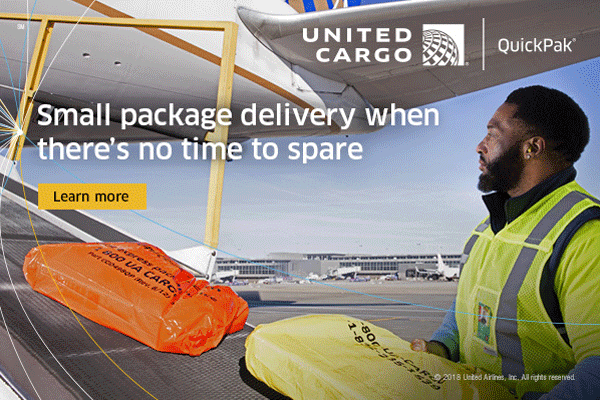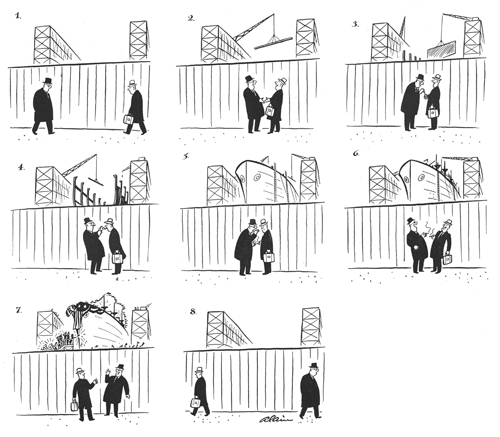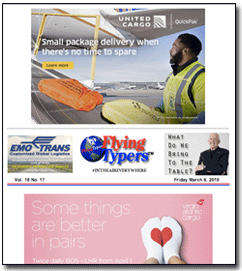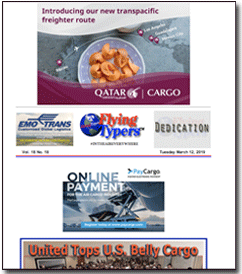|
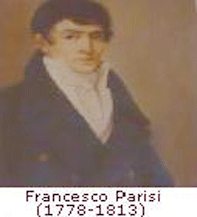 Recently
at a trade show a colleague came by to congratulate us on our having reached
our 44th anniversary serving the global air cargo industry with our publications.
We appreciate the kind gesture and accept with humility the good wishes
of course, but as the first and only FIATA Fellow I have been given access
and illumination of the greater world with all the wonderful people of
FIATA, the global freight forwarder organization. Recently
at a trade show a colleague came by to congratulate us on our having reached
our 44th anniversary serving the global air cargo industry with our publications.
We appreciate the kind gesture and accept with humility the good wishes
of course, but as the first and only FIATA Fellow I have been given access
and illumination of the greater world with all the wonderful people of
FIATA, the global freight forwarder organization.
Here, our friend Marco Sorgetti profiles
a true pioneering family of transportation, Trieste-based Francesco Parisi.
When Parisi went into business in 1807
Napoleon was alive and signed a peace treaty with Russia; Ludwig von Beethoven
debuted his Symphony Number 4 and Robert Fulton launched his first steamboat
on the Hudson River in New York.
Today in 2019, the quiet and unassuming
Francesco Parisi (third generation) is a constant force for good as former
President of FIATA and active builder of global transportation.
Francesco Stanislao Parisi is at the helm
of a complex galaxy of companies owned by the historical Casa di Commercio
Francesco Parisi (registered as Francesco Parisi Sas) which was established
in Trieste on January 1st 1807.
Empire Of The World
Those were the days of the Austro Hungarian
Empire, the Emperor still looking back at his origins with Charlemagne
and the Sacred Roman Empire (800 AD – 1806 AD). The Parisi were
a silk trade family originally from the area of Rovereto, near the lake
of Garda in Eastern Italy. One of the enterprising
Parisi brothers, Francesco landed in Trieste to open his trade in a period
that Napoleon had contributed to making exciting, if we can use that word
to describe it. The company he established with 30 thousand florins in
Trieste survived Napoleon and thrived in the territories of the empire
through the tumultuous times that followed the fall of Napoleon, the rise
of new powers (Italy was unified by the Savoy in 1861) and the fall of
the Austro Hungarian Empire in 1919, triggered by the unfavourable end
of WWI in 1918.
The company also survived WWII and the
forced nationalizations that were imposed by the winners across Eastern
Europe. Despite the considerable unrest of this century, the Parisi were
however able to take advantage of the opening of the Suez Canal in 1869
and expand their trade in Italy, Germany, Eastern Europe, Turkey, Israel,
Egypt and more recently New York, Buenos Aires, Hong Kong and many other
areas in the Far East.
Francesco Today
Francesco, now 66, is not a man who boasts
his company’s achievements and some may underestimate the level
of his actual success. He is today the Chairman of a number of successful
port-related activities in Trieste, he served long terms of office in
Fedespedi of Milan and CLECAT in Brussels; as prominent member of the
Italian freight forwarders’ federation, he was successfully nominated
in FIATA’s Presidency in 2009. He became President of FIATA on 19th
of October 2013 in Singapore. During his terms of office until 2015, FIATA
went through one of the most complex transitions in its history and started
a profound debate, which Francesco launched among its constituents, following
the rejection of the proposal to move FIATA’s Head Office to Brussels
in 2014. I am proud of having assisted Francesco in this intricate period
of his life, but I doubt a man with this pedigree actually needs any further
assistance other than provided by his own intuition.
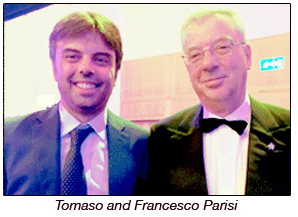 Let us go back one step, as we must also
pay tribute to somebody who has been together with Francesco for the best
part of his life and has given him two sons, who are now prominently employed
in the family business: Tomaso and Matteo. The mother of the two young
and enterprising Parisis is Marina Grimani, a lady who is one of a kind.
Let us go back one step, as we must also
pay tribute to somebody who has been together with Francesco for the best
part of his life and has given him two sons, who are now prominently employed
in the family business: Tomaso and Matteo. The mother of the two young
and enterprising Parisis is Marina Grimani, a lady who is one of a kind.
Early in my employment in FIATA I was asked
to organise my second Presidency meeting in Venice. Francesco, who was
then Senior Vice President, understood that I was coming from rather far
in trying to pull the event together. He generously offered to help, which
meant a helping hand from the entire family, Marina, his wife, first in
line. He unassumingly said “Marina is from Venice”: I had
no idea what that actually meant.
Anywhere in the world, preparing for the
FIATA Presidency meeting is always a real job: there is content, study,
research, deadlines and a great deal of logistics. With its completely
original transportation system, Venice is very challenging from an organisational
point of view, it manages to surprise even the most hardened traveller,
but thanks to Francesco and Marina the city opened its wide wings to us
like it would have never been possible otherwise.
When I say “otherwise” I mean it.
You may wish to know that Marina is indeed from Venice as Francesco said,
her family having in fact contributed to the Most Serene Republic’s
fortunes for several hundred years; she is one of the descendants of the
Grimani family (https://en.wikipedia.org/wiki/Grimani_family)
who gave the Most Serene Republic three of the Venetian Doges (Antonio
Grimani in office 1521-1523), Marino Grimani (in office 1595 – 1606)
and Pietro Grimani, in office 1741 – 1752), as well as a palace,
amongst other treasures, which is now a museum.
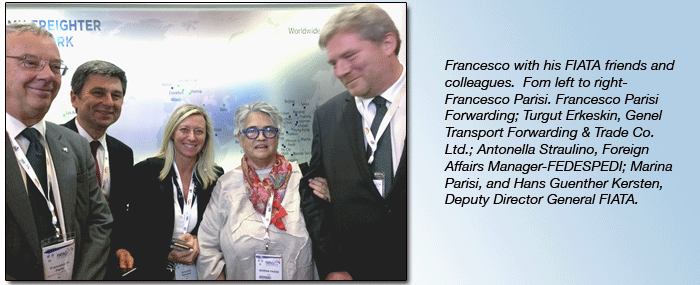 |
Far from being improvisers, the Parisi know what
needs to be done. This is how I ended up living as Marina’s and
Francesco’s guest for a few days in a historical palace on the Canal
Grande. It had happened that I made friends with Marina at the FIATA Congress
in Dubai in 1999, when she introduced herself as Francesco’s wife,
but at that time I sincerely ignored her very uncommon lineage. We were
instantly attracted to each other as friends and that was sufficient:
we did not know that eventually I would have become the director of FIATA
by the time when her husband would ascend to the highest position in the
organization. Life can be surprising indeed.
Extracting a few words from an article which
was published by the local newspaper “Il Piccolo”,
we apprehend that “in the offices of Viale Miramare, time seems
to take a pause for reflection. The open space layout, with large windows
designed at the dawn of the twentieth century, remained the same [since
then], and between an image taken in the thirties and a snapshot of today’s
offices the only change in sight is made by computers taking the place
of the office machines. The ancient furniture of the “Old Principal”,
in a wing of the first floor, allows you to take a look at how things
were a couple of centuries ago, when the Parisi wove a network of commercial
transactions that from Trieste expanded around the world.”
I can precisely relate to this feeling. Entering
Francesco’s office in Trieste is both like going back in time and
establishing connections with today’s and tomorrow’s trade,
holding on to an unwritten bond which occupies these evocative spaces.
In replying to the journalist who asked Francesco to reveal the secret
that had allowed the Shipping House Franceso Parisi to “remain so
organically compact from 1807 to today,” he said:
“Well, that is for us the corporate culture
which goes beyond personal choices, it is stronger than the will of the
individual: even though my father had never done anything to push me to
enter the family business, this is where I am now.”
The article continues with a long and detailed
historical account of the many successive generations which firmly held
the steering wheel of the family enterprise. It starts as follows: “a
young man called Francesco Parisi, 28 years old, arrived from Rovereto,
where his father had long started a silk spinning and weaving business.
It was an important factory, honoured, in 1765, by a visit of Emperor
Joseph II.” After the death of the paterfamilias the three sons
Girolamo, Giuseppe and Francesco were in the position of having to decide
on their business. It was decided that Girolamo would remain in Rovereto,
Giuseppe would conduct the business in Vienna, while Francesco would try
his luck in Trieste.
One generation after another the Parisi managed
to stay ahead of epochal changes and thrive with new business, e.g. the
rise of the steamship in the maritime industry kicked in the company as
a speed machine and gave it new opportunities in all directions, not only
in the direction where the wind was blowing.
In Francesco’s historical archives there
is a catalogue of several items of private and public correspondence,
which reaches two full pages by merely listing the names of the Parisi
having produced such correspondence and the years when this happened since
1807. My feeling is to consider this trove as a kind of private museum
of trade and shipping across three centuries.
There are not many of these vestiges anywhere
else in the world, going back to a period prior to any of the laws and
conventions governing our business: Parisi is one of the oldest logistics
enterprises still in existence and it does hold treasures preserved under
the same family ownership for 211 years.
 |
The extreme summary of what Parisi stands for
today is a group of companies that employs 800 staff in thirteen countries
embracing three continents and three main business areas: freight forwarding,
marine agency and port and logistics infrastructure management. It is
a lean management for a business that has learnt through the course of
time how to make do with the bare essential in order to produce excellence.
So my friendly advice to the readers who will
attend the FIATA Executive Board Meeting next week in Zurich or the World
Congress in Johannesburg later this year is to look for Matteo or Tomaso
Parisi, or even Francesco. I am sure a conversation with any of them can
be quite rewarding: even if it were not strictly connected to business,
it could be a dive in the history and culture of logistics.
Marco Sorgetti
|


